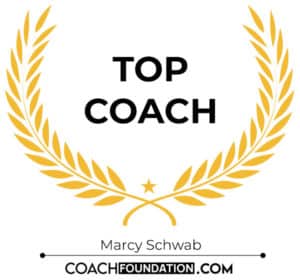“Marcy Schwab has been recognized as one of the Top Leadership Coaches from America by Coach Foundation.”

January 21st, 2015 by Marcy Schwab
“Blah, blah, blah” goes on in the background while I sit and think about exactly what it is I want to say. Except that the person talking isn’t at the front of a large room or lecture hall, and it’s not a person running a conference call with 30 people. The person talking is sitting right in front of me, talking to me (well, at me, really), and I’m pretending to listen but not really listening. At. All.
The above describes something like 90%+ of the “conversations” I used to have everyday. The chatter in my head was constant, the ideas I had were better or more important, my mind wandered. And while I may have gotten the gist of what was being said to me, I certainly didn’t get the nuance. Sometimes, I didn’t even the gist, but instead, I got the gist of what I thought the other person was going to tell me. So, I guess it was all about me.
Listening is hard. It’s very hard. And most of us don’t do it well. We’re taught from a very young age that if you don’t speak up and contribute loudly, you may never be heard. The fact is, when you speak up and contribute loudly, it’s only valuable if someone else is listening. And that person can’t be speaking up and contributing loudly at the same time.
What is listening?
Really listening to someone means focusing on the other person and not on you. When you’re really listening well, you hear the words that are being said, the words that are not being said, and the underlying emotion and feeling associated with what’s being said. If you’re a really honed listener, you will use your intuition to understand the other person at a deeper level.
What do great listeners do?
Great listeners tune out their own commentary and opinion and focus on the other person. They ask questions to reach deeper meaning. They probe into the feelings about or impacts of what’s being said, and they toss their own assumptions aside and make sure to understand their companion. You’ve probably had a number of conversations where someone was really listening. What did that feel like?
What’s the result of great listening?
Trust.
Think about your closest friends and family – the people you trust the most and who trust you. Chances are, they are the ones who listen openly and intently and do not make assumptions. One of the best ways to establish trust with someone is to listen to them. It is the best indicator that you care.
How can you listen more carefully and talk more thoughtfully?
Listening is a skill we can all stand to further develop. It’s the ultimate compliment and a tremendous gift. Happy listening!
Comments are closed.
“Marcy Schwab has been recognized as one of the Top Leadership Coaches from America by Coach Foundation.”
